It was New Year’s Eve 1999 in a Davao City compound, and Arlene Stone was convinced the world was going to end. Jesus Christ was going to come down from a cloud, and she would go to heaven along with the other members of her religious group.
That’s what Stone said she and others in the Kingdom of Jesus Christ had been told by their spiritual leader, Apollo Quiboloy, known by his followers as the “Appointed Son of God” or “Owner of the Universe.” Stone had followed Quiboloy’s teachings since she joined his group in 1991 as a young teen. She believed him.
For the record:
8:30 a.m. Sept. 24, 2024A previous version of this story said that Quiboloy was known by his followers as the “Anointed Son of God.” The correct phrase is “Appointed Son of God.”
But there were no clouds, Jesus Christ made no appearance and the world did not end.
Instead, she said, there were just two fog machines blasting and Quiboloy, who descended from the sky not in a cloud but in a helicopter. He had told his followers the end was nigh. But nigh was here and the end was not.
“At that point I started to be doubtful,” Stone said.
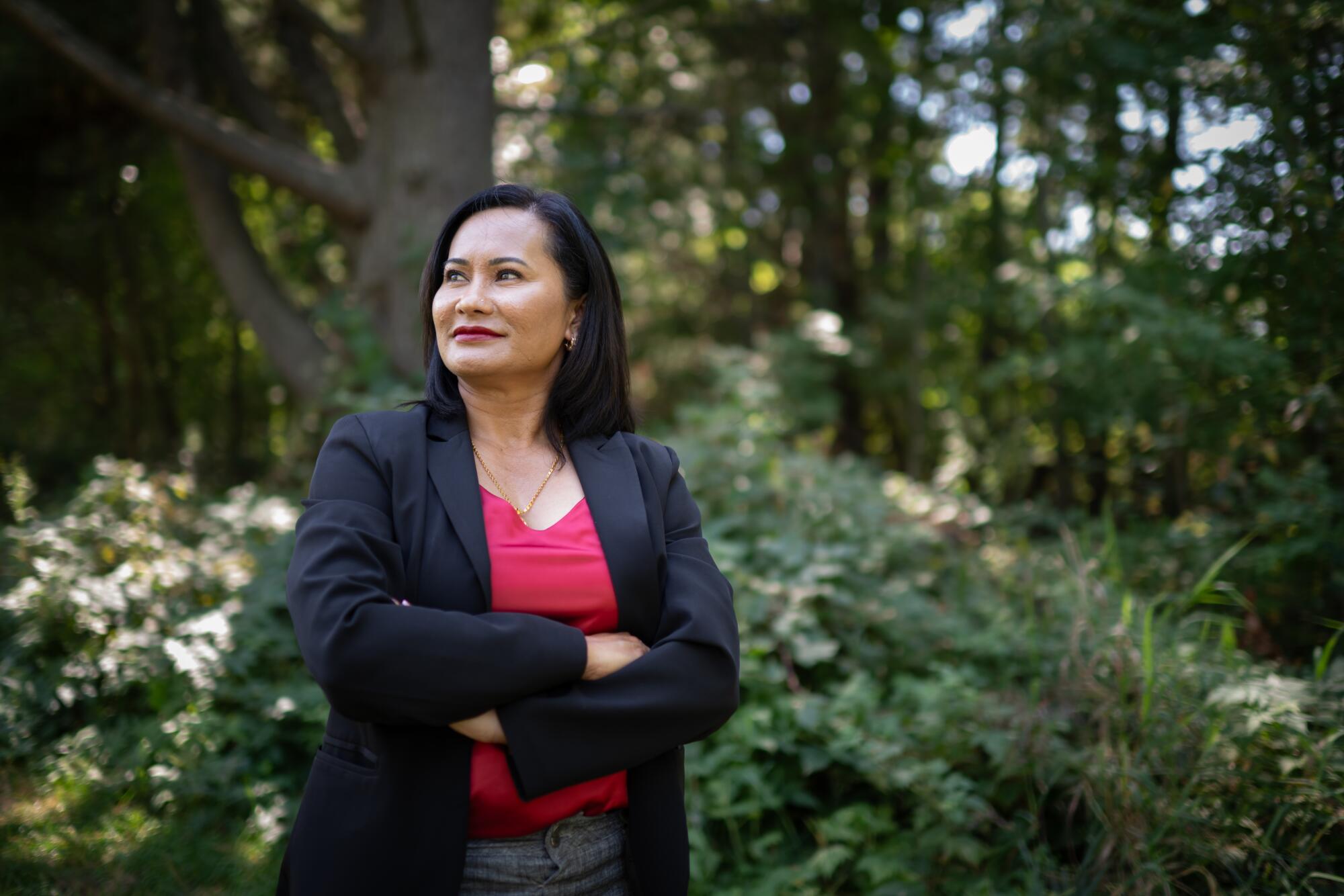
Arlene Stone at her home in Minnesota. She says she was physically abused as a member of the Kingdom of Jesus Christ, run by Apollo Quiboloy, for nearly a decade.
(Caroline Yang / For The Times)
This would mark a turning point for Stone, who would eventually leave the church, move to Minnesota and turn against Quiboloy, prompting the Filipino Senate to investigate crimes she alleged he had committed. She also spoke with the FBI for its inquiry into Quiboloy.
On Sept. 8, Quiboloy was arrested by Filipino authorities after a two-week siege on the same Davao City compound where he told Stone the world would end in 1999. He has been charged in California and the Philippines with a raft of crimes, including human trafficking and child sex abuse. He’s been accused of rape of minors, though his lawyers have steadfastly denied all charges against him.
“The allegations made by these so-called victims are completely baseless and absolutely false. There is not a shred of truth to these claims — not even a scintilla,” said Quiboloy’s lawyer, Israelito Torreon, in a Facebook post. Torreon did not respond to requests for comment.
In the quiet early morning hours of Jan. 29, 2020, at least a dozen FBI agents gathered outside a small church in Van Nuys, weapons drawn. They arrested numerous members of the Kingdom of Jesus Christ.
Federal prosecutors accused them of massive immigration fraud and human trafficking. The group required workers, many of them immigrants from the Philippines, to beg in the streets for donations, the indictment alleged. Although the leaders said the money would aid Filipino children, it actually went directly into church operations and to fund the high-end lifestyles of Quiboloy and other church leaders, prosecutors alleged.
Victims faced mental and physical abuse if they did not meet their daily fundraising quotas, federal prosecutors said in the indictment.
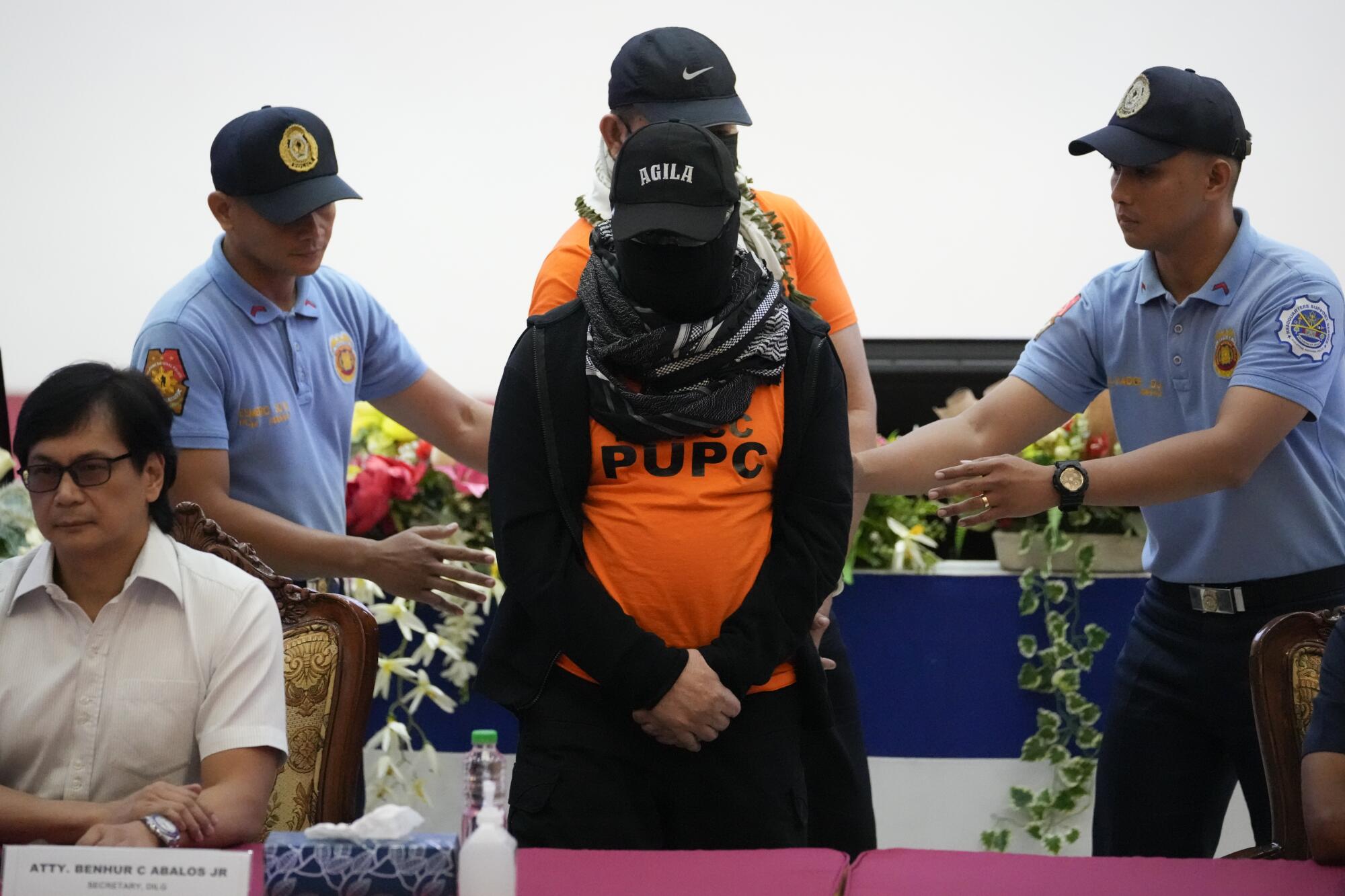
Apollo Quiboloy, center, appears at a news conference at the police headquarters in Quezon City, Philippines, this month.
(Aaron Favila / Associated Press)
The defendants were charged with conspiring to commit immigration fraud by forcing members into sham marriages so they could become U.S. citizens, which would allow them to stay in the country and continue to raise money for the Kingdom of Jesus Christ.
The church opened its compound in Van Nuys in the 1990s and Quiboloy would visit once or twice a year to preach. The Van Nuys members, like their counterparts in the Philippines, would beg in the streets for donations for the group. When Quiboloy was arrested in the Philippines, they protested outside the Filipino embassy.
One former church member from Arcadia, who asked to remain anonymous for safety reasons, recalls soliciting for the church when he was just 11 years old. He would sing at restaurants and sometimes be taken out of state to raise money for charity. He said he thought at the time that he was volunteering, but he realized as he got older that the church was demanding that he work for free.
“It was go to school, come home to church, solicit. Go to sleep. Wake up, go to school, solicit. Weekends, solicit,” he said.
In one instance, he said, he crashed a church car he was driving and was told it was because there was a demon inside him. He was punished, he said, to get the demon out.
He was thrown out of the church in 2019 when he was 21 for having a relationship with a woman in the church.
“I certainly still thought the church was salvation. So when I was kicked out there was a fear I was doomed to hell,” he said. The more time passed, the more he started to see the “reality of things,” and the more he realized that “Quiboloy was just another person like you and me,” he said.
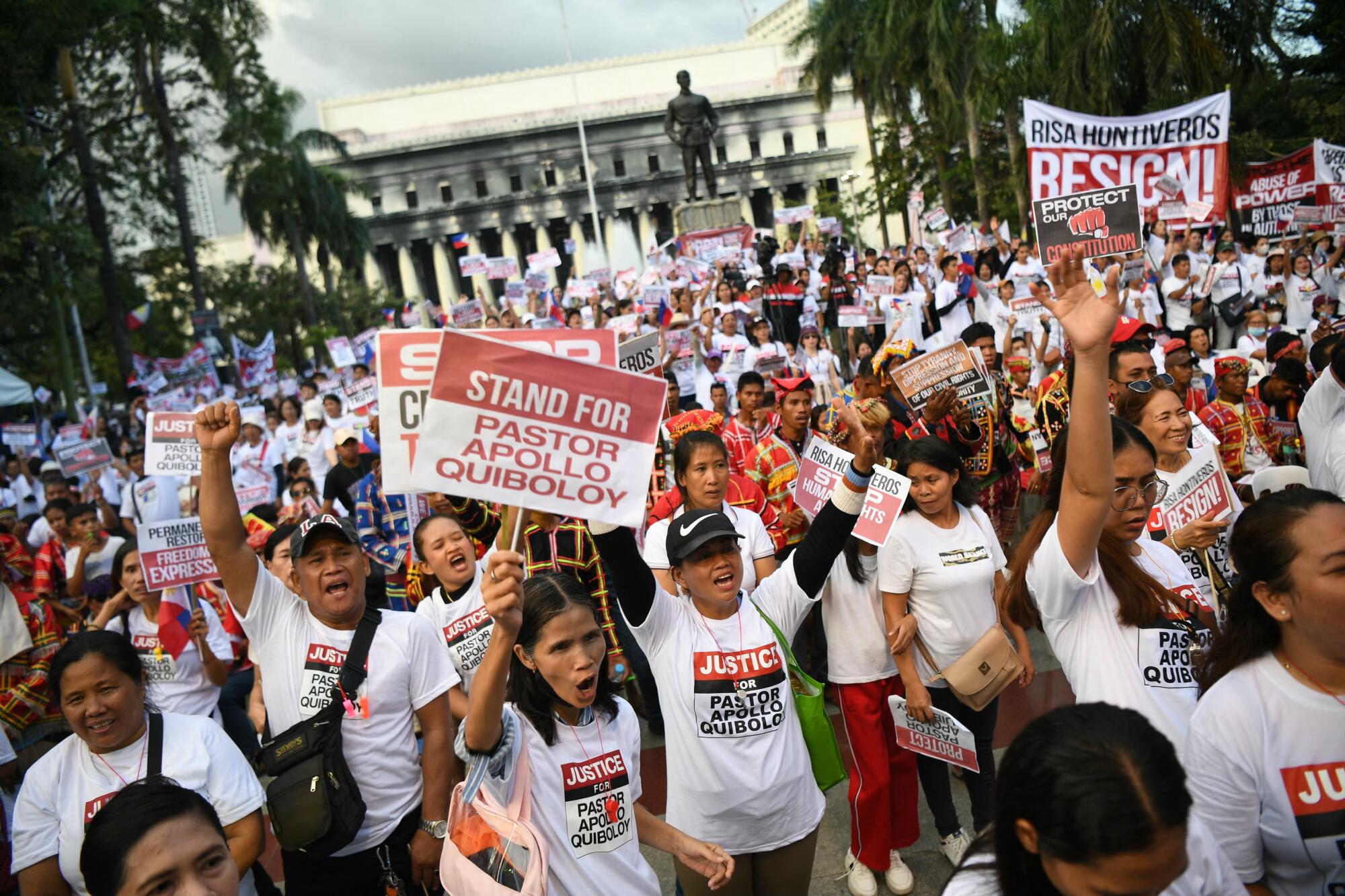
Supporters of Apollo Quiboloy hold a prayer rally at a park in Manila on March 4, 2024.
(Ted Aljibe / AFP / Getty Images)
Although the feds’ charges against Kingdom leaders initially focused on forced labor, something even more sinister was going on, prosecutors alleged more than a year later.
In November 2021, the U.S. attorney’s office for the Central District of California filed a superseding indictment in the case, charging Quiboloy with masterminding a global sex trafficking conspiracy.
He and his top aides recruited what they called “pastorals,” young girls and women between the ages of 12 and 25 who worked as choir singers and assistants to the leader of the group. They would clean Quiboloy’s room, provide him with meals and give him massages, the indictment alleges.
But they also had to engage in “night duty,” the indictment alleges: sex with Quiboloy under threat of “physical and verbal abuse and eternal damnation” if they refused.
If they so much as hesitated, they were told the devil was inside them, they told prosecutors. They were not allowed to speak with other men in the Kingdom of Jesus Christ, and they were forbidden from mentioning their night duties, prosecutors said.
Some of the acts in the alleged sex trafficking conspiracy were committed in California, according to the indictment.
Quiboloy was placed on the FBI’s most wanted list, where he remains today.
When Apollo Quiboloy was born in 1950, his mother saw God sitting on top of a cloud. “That is my son,” God said to her, according to Quiboloy’s self-constructed mythology. The youngest of nine children, Quiboloy grew up in a poor family in Tamayong outside Davao City. His church says he had his first spiritual vision when he was 14, dreaming he saw the end of the world.
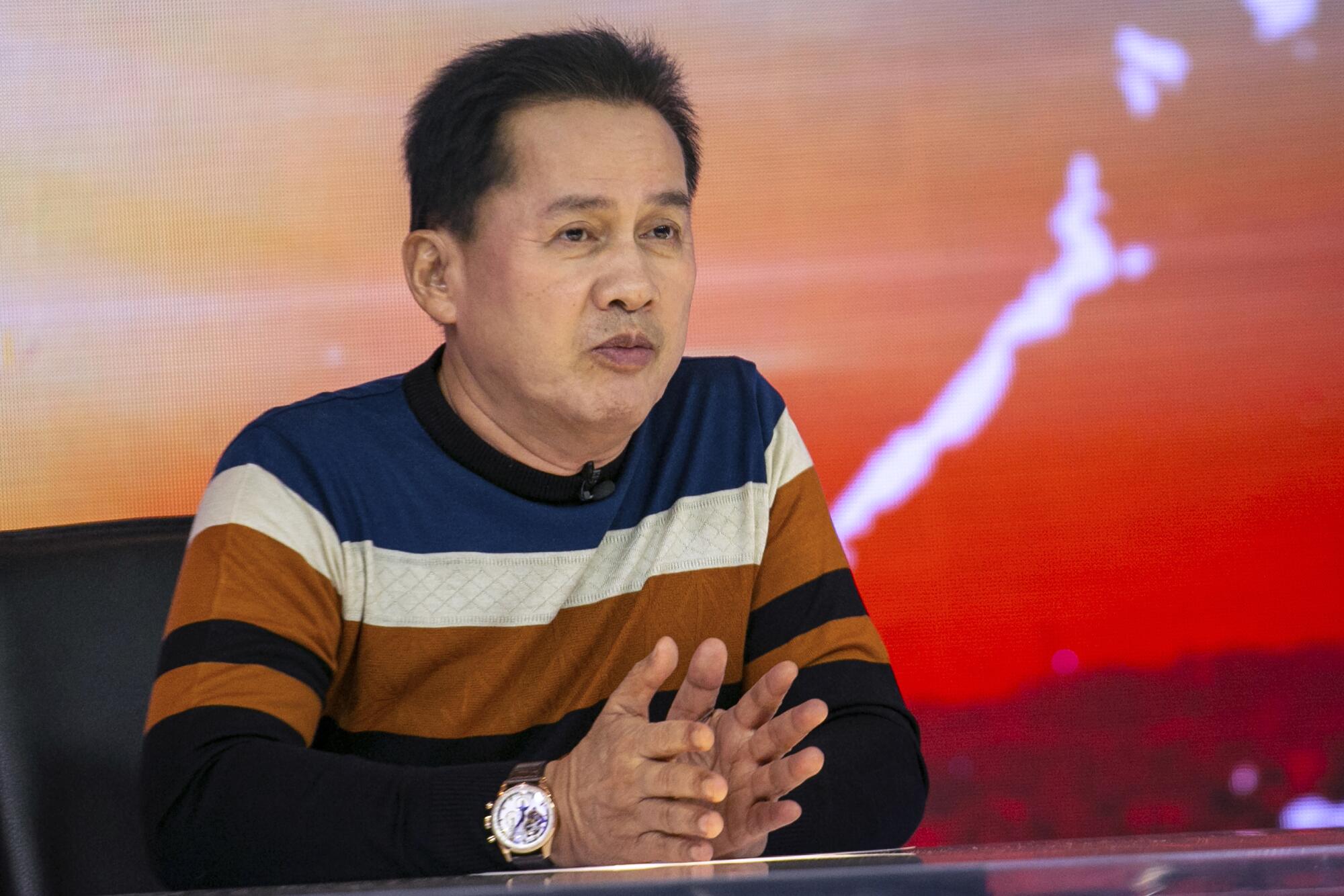
Apollo Quiboloy appears on his talk show in May 2016 in Davao City, Philippines.
(Aaron Favila / Associated Press)
He became a preacher and began hearing God’s voice at various times and places — during sermons, say, or at an airport, God spoke to him.
“I will use you,” God would say to him repeatedly, according to Quiboloy.
He started the Kingdom of Jesus Christ in 1985, recruiting “full-time miracle workers” to collect donations that they were required to turn over to the group.
One of the church’s miracles was the transformation of Quiboloy’s lifestyle. Known for flying in private planes and helicopters, the pastor’s close associates own numerous million-dollar properties in the United States, including in Calabasas — all while his working-class congregants begged in the street and sold trinkets.
The pastor became a polarizing figure in the Philippines. He claims to have 4 million followers there and more than 2 million abroad. For more than three decades, he was a close confidante and friend of Rodrigo Duterte, the Philippines’ authoritarian president from 2016 to 2022.
“Quiboloy has amassed power and rubbed elbows with some of the most prominent individuals in the country, particularly the Duterte family, all while systematically abusing women and children,” said Sen. Risa Hontiveros, echoing the criminal allegations against him. Hontiveros led a Senate investigation into Quiboloy this year.
Quiboloy’s arrest exposed rifts between the two most powerful families in Filipino politics: the Dutertes and the Marcoses. Rodrigo Duterte’s daughter, Sara Duterte, is currently serving as vice president while Ferdinand Marcos Jr., the son of the country’s former dictator, is president. (The president and vice president are elected separately in the Philippines.) Marcos supported the arrest, while Sara Duterte suggested law enforcement might be targeting Quiboloy because of his support for her family.
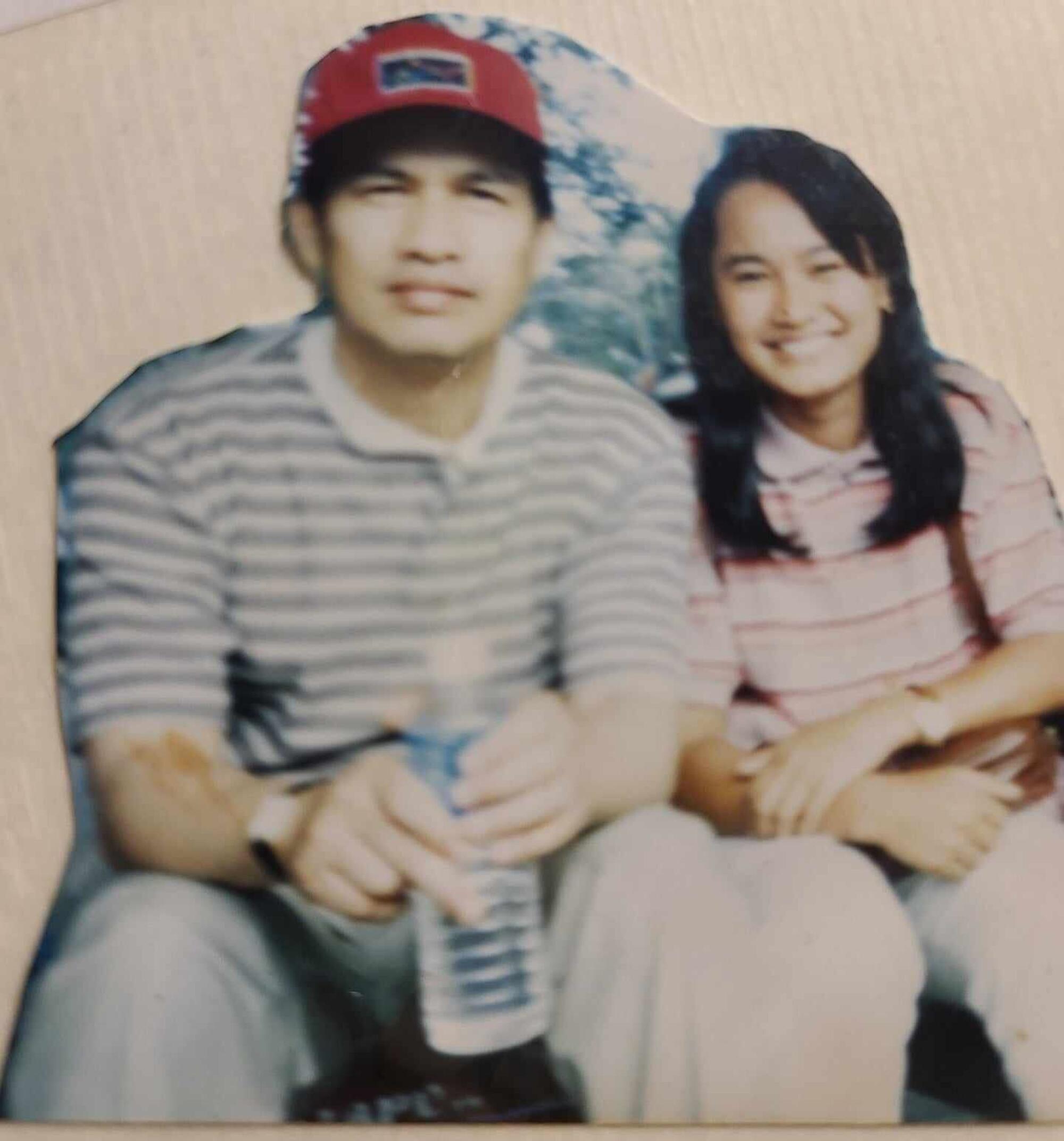
Arlene Stone sits with Pastor Apollo Quiboloy in an undated photo.
(Courtesy of Arlene Stone)
Stone — who grew up in poverty, like Quiboloy — became a pastoral when she was in her teens, leaving her family along with her older sister, Estrella, to live with Quiboloy. Unlike what prosecutors alleged about some pastorals, Stone never had sex with Quiboloy and was never asked to. But she said she felt she was being groomed by the Kingdom to become his sexual partner in the future.
Still, she said, she experienced some of the violence that others who were in the Kingdom alleged. Stone repeatedly got in trouble for associating with male members of the Kingdom and was punished directly by Quiboloy.
One time, she said, he hit her 60 times with a paddle.
“He asked me, ‘Do you know why you’re here?’ I said, ‘Yes, sir.’”
In another instance, he punched her in front of other congregants, she said.
“He told everyone that I was talking to the opposite sex,” she said. “He punched me right there in front of everybody.”
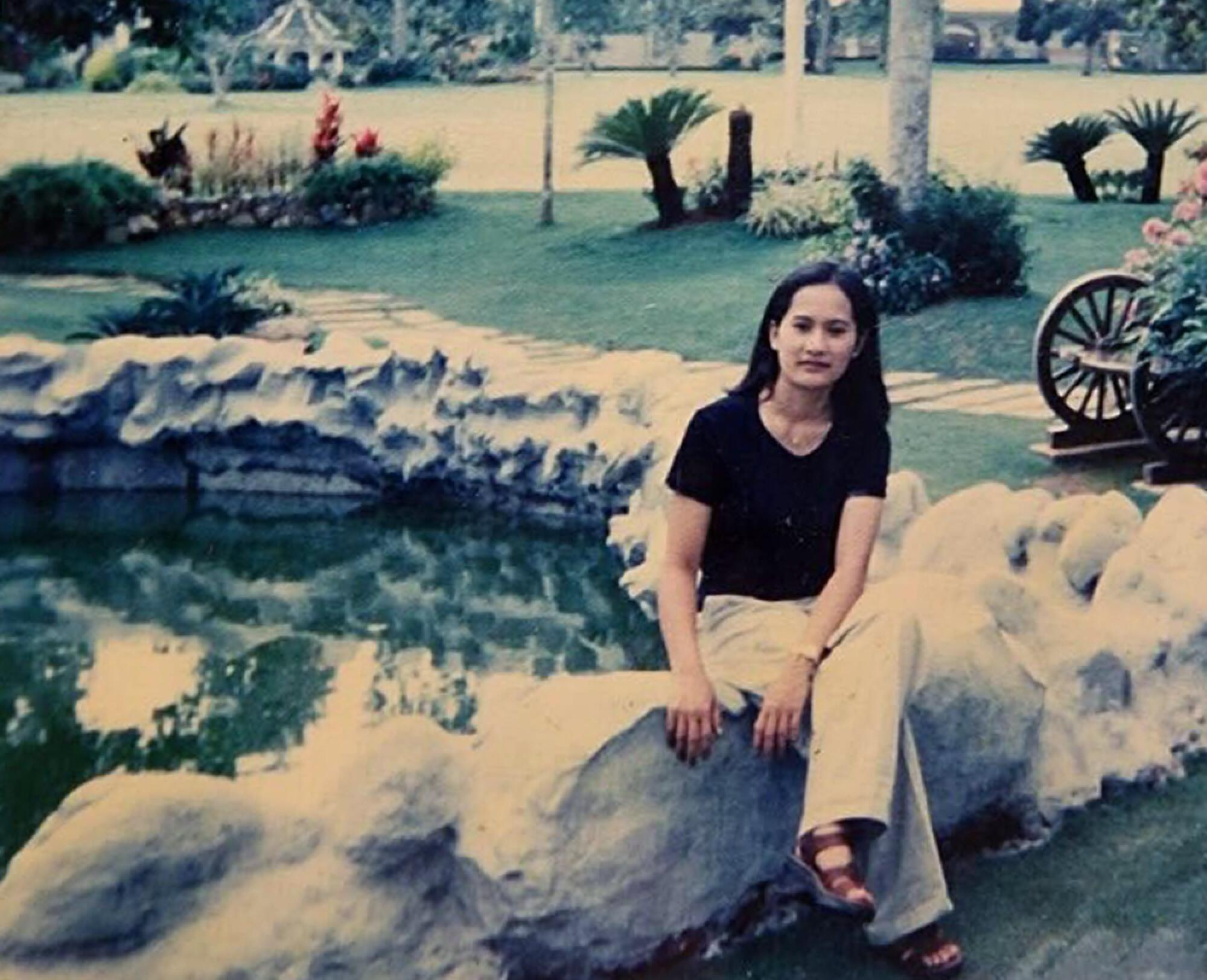
Arlene Stone sits on rocks outside the Garden of Heaven Restored in the Philippines.
(Arlene Stone)
Stone said that she was moved to Mindanao after failing in her duties as a pastoral, tasked with raising money for the Kingdom and getting others to raise money as well.
The turn of the millennium was coming, and Stone believed, based on Quiboloy’s teachings, that the world would end. Still, she said, the pressure to raise money for the Kingdom did not relent just because the end was near.
There was a woman in Mindanao who owned a small farm and livestock, Stone recalled. Stricken with cancer and needing chemotherapy, the woman planned to sell her farm to pay for the treatment, but Stone persuaded her to give it all to Quiboloy, who she said would perform a miracle on the woman.
“She believed in me and she gave everything she had to Quiboloy,” Stone said.
After the millennium service, when the world did not end, Stone could not bring herself to go back to Mindanao and find out whether the woman survived — or face the members whom she had convinced to give the Kingdom everything.
She left the church and eventually married an American man, moving with him to Minnesota. “But I still had my heart in the cult,” she said.
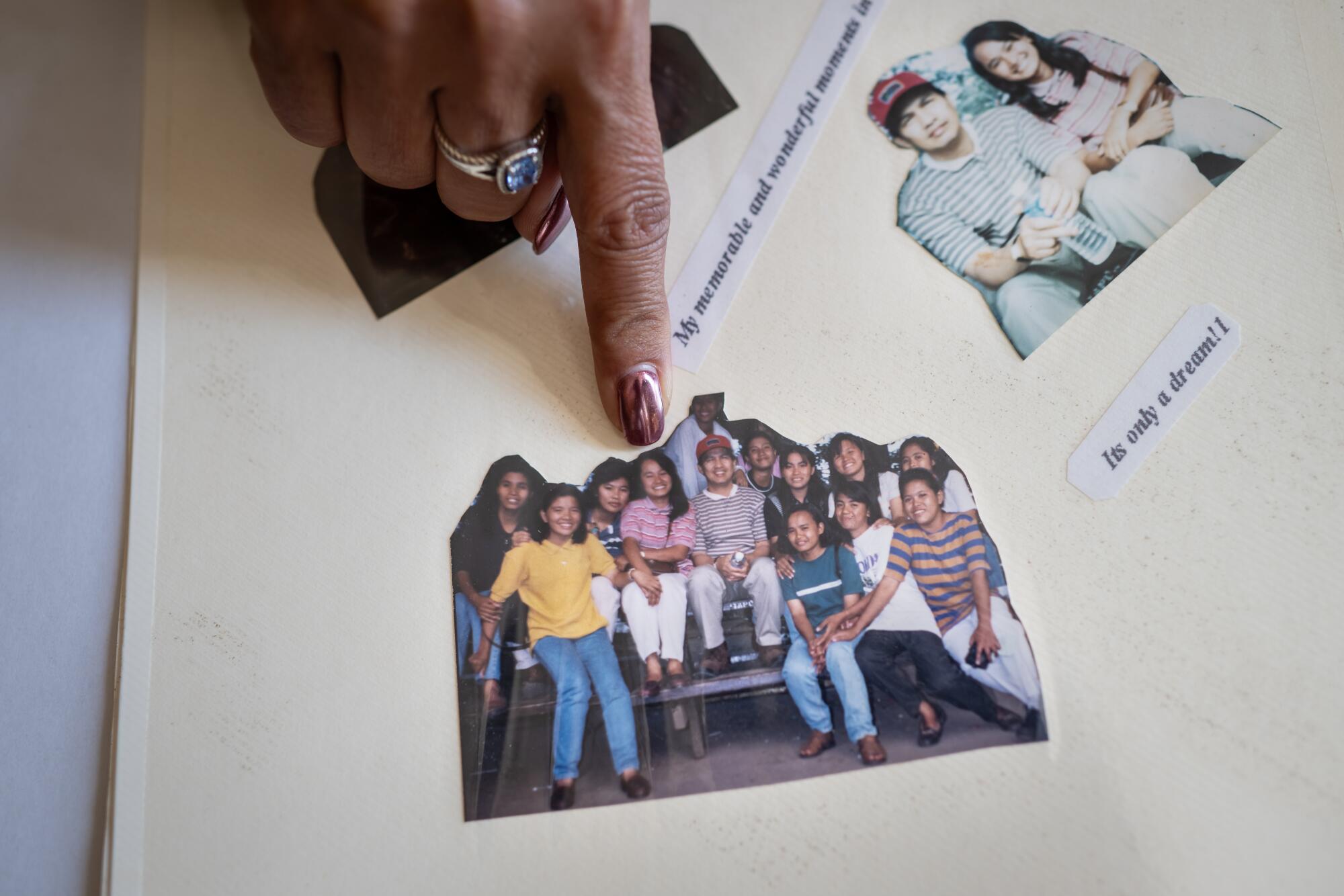
Arlene Stone points to an old photo of herself sitting next to Apollo Quiboloy and other members of the Kingdom of Jesus Christ church.
(Caroline Yang / For The Times)
Despite leaving the Kingdom and the Philippines, Stone was as important to Quiboloy as ever.
She was an American citizen, married to an airline pilot. She had a young daughter.
Every time Quiboloy visited the United States, he would ask to see her, Stone said.
She visited the Van Nuys complex numerous times and would resume her erstwhile duties as a pastoral as if she’d never left the Kingdom. She cooked and cleaned for Quiboloy. She was half in, half out.
At one point, she said, six men from the Kingdom came to her door in Minnesota and asked her to help them rent a car, since none of them could legally do so. Stone’s husband told her not to, but she did it anyway.
The men totaled the car, Stone said, and the Kingdom refused to pay the $18,000 bill. On top of that, they were also asking her to give her weekly donation.
“I burst,” Stone said. “I said f— that. I was so mad.”
After that, the Kingdom sent her a disconnection notice.
Stone, who’d left school after the eighth grade, decided to resume her education. She wanted to understand why she had joined the Kingdom. She studied psychology, theology and comparative religion.
As she studied, memories came back.
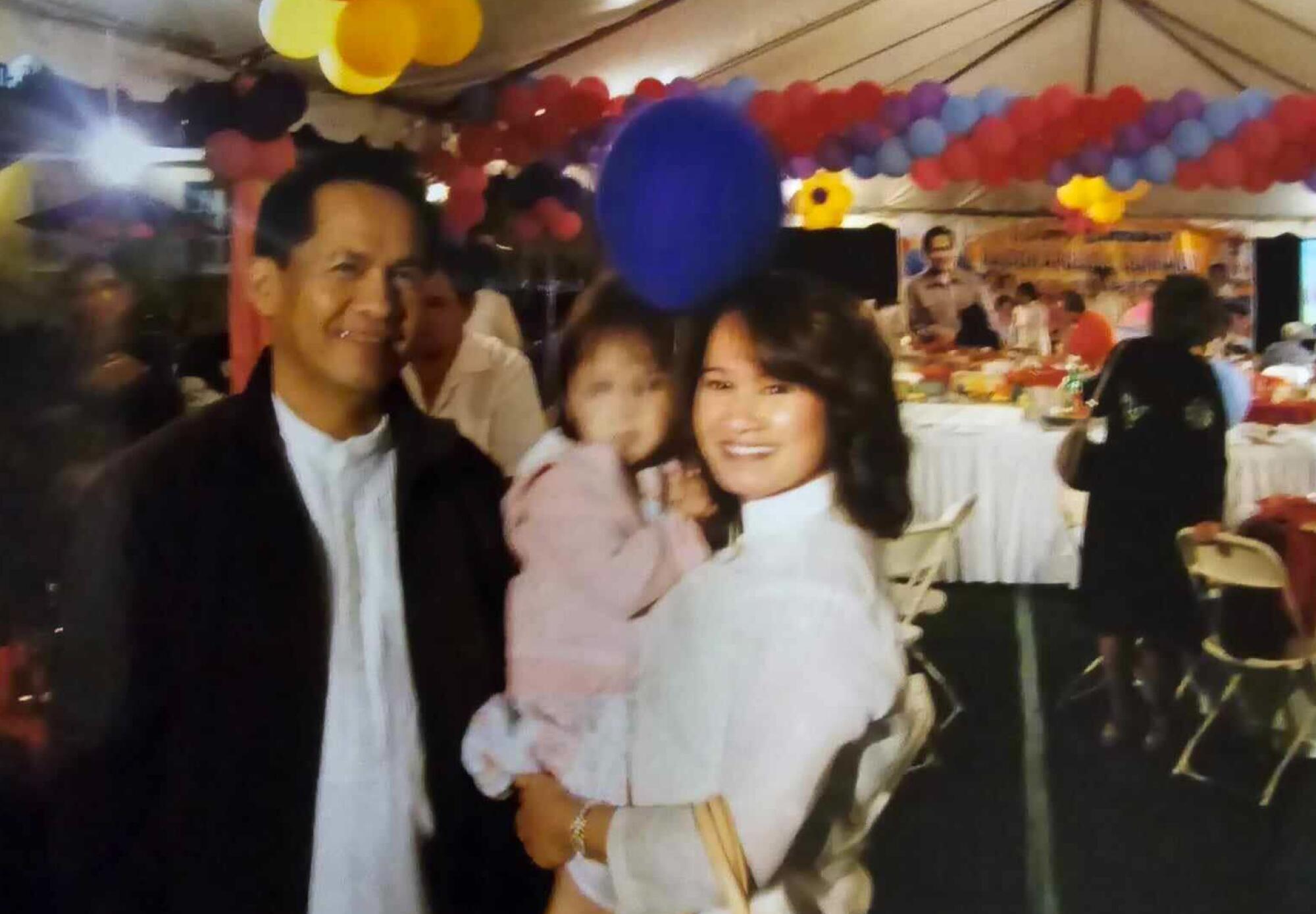
Arlene Stone, holding her child, stands with Pastor Apollo Quiboloy in Los Angeles.
(Courtesy of Arlene Stone)
“The things I observed there when I was younger. What were those things? Why were those things normal?” she wondered.
She realized her purpose was to bring down Quiboloy, she said.
Former members of the church came to her to talk about their experiences in the Kingdom. Stone began speaking with the FBI, which she said started investigating Quiboloy in 2015.
She also reached out to Hontiveros, asking the Filipino legislative branch to investigate Quiboloy and allegations against his church.
The investigation, with public hearings, began in January and were spurred on by Stone’s request, according to Hontiveros.
“Arlene assisted us in vetting and verifying information that only former [Kingdom] members would know or have access to. She is also trusted by many victim-survivors, so she would often act as a liaison between the survivors and our office,” Hontiveros told The Times.
The investigation led the Philippine Senate and the national police to seek Quiboloy’s arrest on sex crime charges.
“He is now exposed as this huge con man who used the word of God for his own devious gains. After months of hiding, of mocking the rule of law, there is collective relief that, finally, this false prophet will face repudiation,” Hontiveros said.
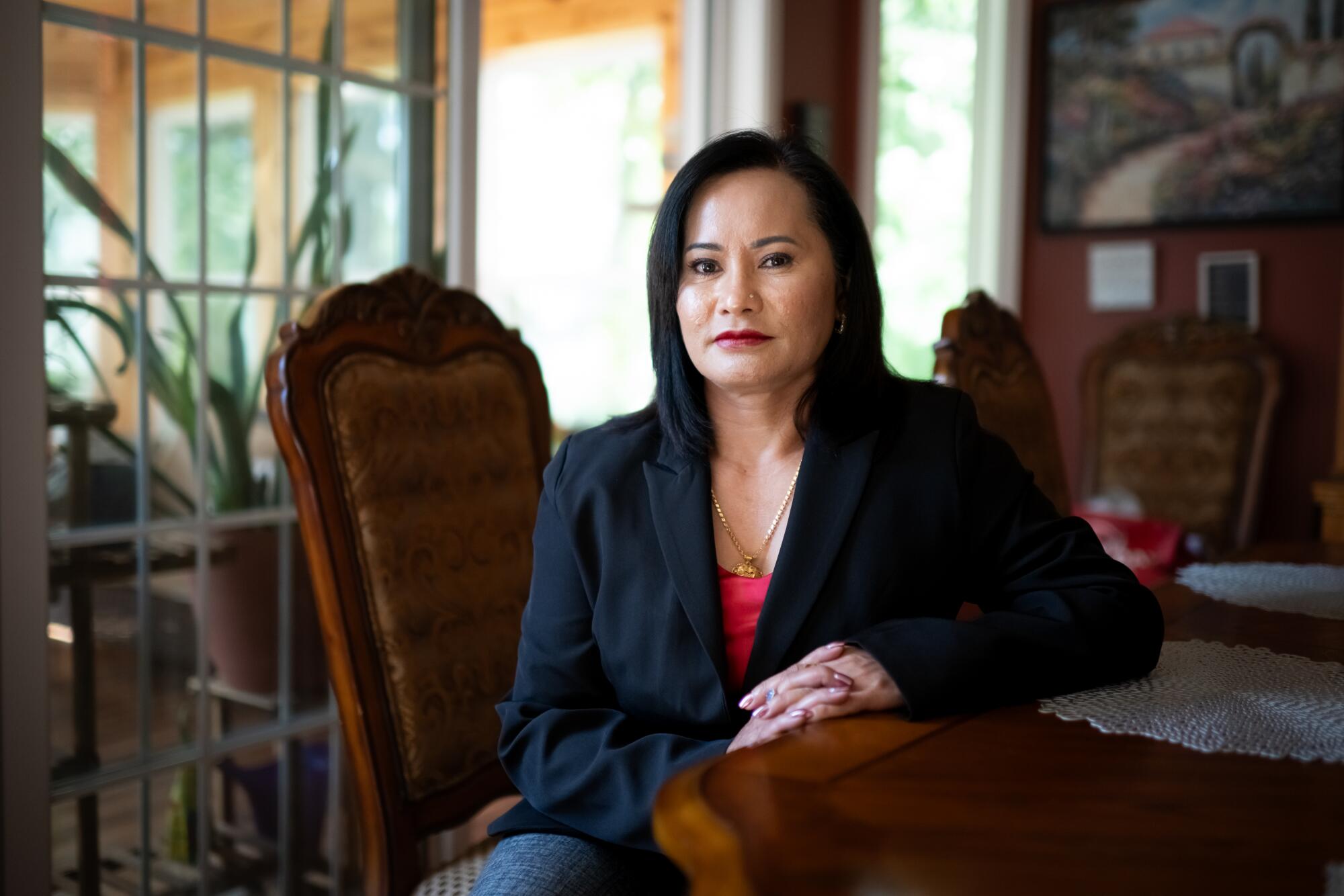
Arlene Stone now speaks out about her experiences at the Kingdom of Jesus Christ and advocates for others who were drawn into the controversial church.
(Caroline Yang / For The Times)
Stone was asleep in Minnesota when a friend called to inform her of the news. The man who baptized her, the one she used to believe was God’s son, had been arrested. The man who had allegedly beaten her, who had told her the world would end, who tried to get her to rejoin after she left the church.
She had mixed feelings, then realized the work was nearing completion.
“I felt a relief,” she said, “to know that justice is almost reached.”
